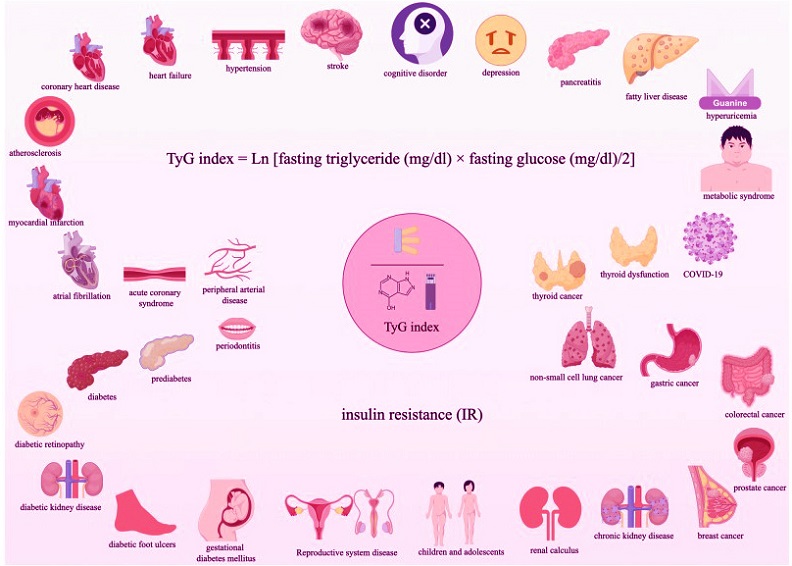The Triglyceride-Glucose (TyG) Index Set to Become a Standard Biomarker in the Healthcare Industry
Nikhil Prasad Fact checked by:Thailand Medical News Team Oct 30, 2024 4 months, 4 weeks, 18 hours, 7 minutes ago
Medical News: A Breakthrough in Health Monitoring
In a major leap for preventive healthcare, scientists have found that the Triglyceride Glucose (TyG) index is likely to become a routine test in assessing various health risks. Researchers from Guang’anmen Hospital, China Academy of Chinese Medical Sciences, Beijing-China, have recently highlighted this breakthrough, suggesting that the TyG index might soon become a common measure for predicting conditions like diabetes, heart disease, kidney problems, and more.
 Association of TyG index with different diseases.
Association of TyG index with different diseases.
TyG index was closely related to different systemic diseases, indicating the role of metabolic parameters in various diseases. The diseases involved include prediabetes, type 2 diabetes, microvascular complication of diabetes, macrovascular complication of diabete, gestational diabetes mellitus, cardiovascular disease, atrial fibrillation, coronary artery disease, myocardial infarction, acute coronary syndrome, heart failure, hypertension, metabolic syndrome, fatty liver, acute pancreatitis,hyperuricemia, thyroid disease, COVID-19, psychological disorder, stroke, cognitive impairment, kidney disease, the reproductive system diseases, cancer and so on
This
Medical News report explores how the TyG index works, its uses, and why it holds promise as an essential health marker. For many, such as those at risk of metabolic issues or cardiovascular disease, this could be a new way to monitor and manage their health.
What is the TyG Index?
The TyG index combines two simple lab results: fasting triglycerides (a type of fat in the blood) and fasting glucose (blood sugar levels). The formula to calculate it is straightforward, making it accessible and easy to incorporate into routine health checks. Studies show that this combined measure can be a sensitive indicator of insulin resistance - a condition where cells in the body don’t respond as well to insulin, leading to high blood sugar and, over time, diabetes.
One of the major benefits of the TyG index is its simplicity. Compared to other, more complex tests for insulin resistance, the TyG index is both cost-effective and reliable, making it ideal for widespread use. This new biomarker could soon become a standard in clinics globally, enhancing early detection and treatment of several chronic diseases.
TyG Index and Diabetes: A Powerful Connection
Diabetes is one of the biggest health concerns worldwide, with millions affected by Type 2 diabetes, a condition strongly linked to lifestyle and metabolic factors. Studies show that each increase in TyG index values is associated with a greater risk of Type 2 diabetes, making it a potential early warning system for those at risk. For instance, researchers from Guang’anmen Hospital noted that patients with higher TyG scores were up to ten times more likely to develop diabetes over time.
The TyG index not only predicts diabetes but also helps track the progression of prediabetes. People with borderline blood sugar levels can benefit significa
ntly from having their TyG index monitored. Such tracking could encourage lifestyle changes or early treatments that prevent prediabetes from progressing to full-blown diabetes, sparing individuals from a lifetime of medication and complications.
Beyond Diabetes: Predicting Heart Disease, Kidney Problems, and More
The TyG index has shown promising results as a predictor of cardiovascular health. In studies on heart disease, individuals with higher TyG scores were more likely to experience issues like atherosclerosis (clogged arteries), which can lead to heart attacks and strokes. One study spanning over a decade found that those with higher TyG index values in early adulthood faced increased cardiovascular risks later in life. This biomarker could thus become invaluable in identifying individuals at higher risk for heart disease before symptoms even appear.
Moreover, the TyG index is emerging as a potential predictor for chronic kidney disease (CKD). Research shows that patients with higher TyG scores are at a higher risk of kidney issues, including progression to end-stage renal disease (ESRD). High TyG levels have been linked to kidney stones and other renal complications. By identifying these risks early, individuals can adopt preventive measures, possibly avoiding severe kidney issues.
Applications of TyG in Pregnancy and Women’s Health
TyG index measurements could also benefit expectant mothers. Women with high TyG index scores before or during pregnancy are at greater risk for gestational diabetes, a condition that can affect the health of both mother and child. Research shows that women who maintain a lower TyG index through diet and lifestyle are less likely to develop gestational diabetes and are more likely to have healthy pregnancies.
In women’s reproductive health, the TyG index has shown predictive potential for polycystic ovary syndrome (PCOS), a common hormonal disorder that can cause irregular menstrual cycles and infertility. Monitoring the TyG index can help identify women at risk of PCOS early on, allowing for proactive management.
The Mental Health Connection: Depression and Cognitive Decline
One lesser-known but impactful aspect of the TyG index is its potential link to mental health. Studies indicate a higher TyG score may increase the risk of depression, especially in individuals with insulin resistance. High TyG scores have been associated with depressive symptoms, which opens up the possibility of mental health interventions that target metabolic health as well.
Furthermore, higher TyG values have been observed in patients with cognitive impairments, suggesting that it could play a role in early detection of dementia-related conditions like Alzheimer’s disease. Early interventions could improve the quality of life and outcomes for individuals at risk of cognitive decline.
Study Findings: A Robust Future for the TyG Index
The study by Guang’anmen Hospital’s research team presents the TyG index as a valuable tool that could transform healthcare diagnostics. From diabetes and heart disease to mental health and reproductive health, this biomarker’s predictive abilities could lead to targeted interventions and better health outcomes.
The study findings were published in the peer-reviewed European Journal of Internal Medicine.
https://www.sciencedirect.com/science/article/pii/S0953620524003753
For the latest Healthcare News, keep on logging to Thailand
Medical News.
Read Also:
https://www.thailandmedical.news/news/lactate-to-albumin-ratio-a-new-predictor-of-icu-outcomes-in-severe-covid-19-patients
https://www.thailandmedical.news/news/czech-republic-scientists-explore-biomarkers-for-covid-19-severity
